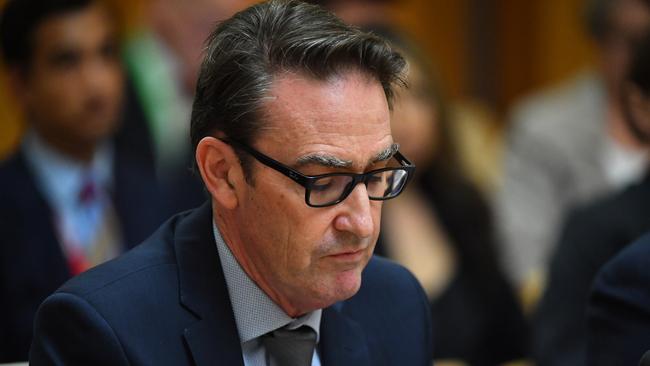Coronavirus to cut growth in March quarter
The coronavirus will cut growth by “at least” 0.5 percentage points in the March quarter due to impacts on tourism, international education exports and some exchange rate effects.

The coronavirus will hit economic growth by “at least” 0.5 percentage points in the first quarter of the year and continue to have an impact beyond June, as Australia faces more risk of a “prolonged downturn” than what occurred with SARS.
Treasury secretary Steven Kennedy said the detraction in growth only took account of direct impacts on tourism, international education exports and some exchange rate effects and did not include supply chain disruptions or other potential broader impacts.
The black summer bushfires will also shave 0.2 percentage points from GDP growth across the December 2019 and March quarters, with most of the impact to fall in the March quarter before reconstruction and recovery activity picks up from the June quarter onwards.
In the past 15 quarters, a 0.7 percentage point hit to GDP would have sent the economy backwards in 11 quarters and left it flat lining in another two.
“The global economic impacts of COVID-19 (coronavirus) are continuing to emerge but there is little doubt that they are serious,” Dr Kennedy told a Senate estimates hearing on Thursday.
“The scale of the economic impact on Australia and the world will depend on a number of factors. The extent to which the virus spreads, how quickly it spreads, disruptions to ports and seaborne freight, and should COVID-19 become more prevalent in Australia, the direct impact it has on domestic economic activity.
“The impact of SARS took on a V-shape, a sharp relatively contained reduction in activity, mostly in Asia, followed by a quick bounce back.
“The economic impact of COVID-19 is likely to be deeper, wider, and longer when compared with SARS. It will create more risk of a prolonged downturn and fiscal support will be needed to accelerate the recovery of the economy, especially once the health and health management effects of COVID-19 begin to fade.”
As the Morrison government prepares a “targeted, measured and scalable” stimulus package to boost confidence and ease pressure on businesses in the midst of coronavirus, Dr Kennedy stressed the economy was actually “quite solid” and travelling well.
Meghan Quinn, Treasury deputy secretary of macroeconomic group, said the department was not forecasting a recession for the Australian economy “at the moment”.
“One of the key bits will be to explain to the community how well placed the economy is to manage such a short-term shock and it will be a short-term shock. It will be longer than SARS but we will recover on the other side,” Dr Kennedy said.
“Because a feature of this shock is how it impacts confidence over business and consumers and how it spreads around the globe, it’s very hard and even frankly potentially unhelpful to be speculating about the increase beyond that (the March quarter) but there’s no doubt the June quarter and beyond will be affected by the shock.”
Finance Minister Mathias Cormann said a stimulus package would not be unveiled on Friday but “very soon” to deal with the immediate challenge posed by coronavirus and the longer term impact.
“Stimulus is not just a cash splash, tax measures and well targeted measures to support business and encourage business investment and well-designed measures on the revenue side of the budget are also stimulatory,” Senator Cormann said.
“We will act as swiftly as we responsibly can. If legislation is required that will be put to the parliament at the earliest opportunity.”
There is one more parliamentary sitting week in March before a six-week break in the lead up to the May budget.
Dr Kennedy noted there was little change in people’s travel habits outside Asia during the SARS outbreak in the early 2000s but that trend had not repeated itself with coronavirus.
“This isn’t just about travel bans, it’s about people’s confidence to travel in this environment and the reassessment or rethinking we’re providing to the government about support in these areas is the potential for travel to slow and we have seen early signs of it from the rest of the world now outside of Asia and that’s something we’re watching very closely,” he said.
Negative economic impacts from the fires and smoke haze were a result of lower household consumption and tourism combined with other effects on the agriculture and forestry sectors.
“This past bushfire season has reminded people of the increased probability of these events in the fact of climate change,” Dr Kennedy said. “The CSIRO predicts climate change will make bushfires more likely as fire weather patterns worsen as a result of an increase in weather patterns with hot and dry winds and fuel becoming drier. Treasury continues to work with its portfolio agencies and other departments to understand the impacts of climate change and their implications for the economy.”
The last time Treasury did modelling on international climate change scenarios was for the Garnaut climate change reviews in 2007 and 2010.




To join the conversation, please log in. Don't have an account? Register
Join the conversation, you are commenting as Logout